|
|
|
Must-Read! The Complete Guide to Singapore DSA 2025 (2): How to Choose Suitable School and Domain
To help parents and students better understand DSA, we have launched the "2025 DSA" series, which will take you deep into every aspect of DSA, from the latest policy interpretations to practical experience sharing, from school selection strategies to methods and techniques, providing you with one-stop information services. Follow our articles to prepare for DSA and help your children realize their dreams of getting into their desired schools!
In the previous article, we provided a comprehensive overview of the basic information, admission ratios, and application process of DSA (click the link below to view the previous content).
Complete Guide to Singapore's 2025 DSA Application, Al... https://bbs.kangaroo.study/forum ... d=1275&fromuid=4038 (出处: 狮城家长论坛)
Many parents may start to feel confused about their children's DSA applications:
Faced with numerous school choices and domain classifications, how to make the most informed decision?
What competitions and awards can be referred to for different domains?
It's almost the end of March, what preparations can be started now?
Today, as the second article of the "2025 DSA" series, we will provide a detailed analysis of how to choose the suitable school and domain based on your child's interests and strengths, and provide you with admission data from top schools, as well as the DSA matters that parents and children can explore now.
Whether your child is inclined towards academic domains or non-academic domains, this article will provide valuable reference information to help you and your child navigate the DSA application process with ease!
1. Eligibility and Considerations for DSA Application
1) Which students can apply for DSA?
DSA does not restrict nationality, whether your children are a Singapore citizen, PR, or foreign student, as long as they meet the conditions, they can apply. The following are the eligibility criteria for different student groups:
1- Singapore citizens and PRs
Currently studying P6 in a government primary school
Will take the PSLE exam after applying for DSA
2- Foreign students studying in Singapore government primary schools
Entered Singapore government primary schools through the AEIS exam and are currently studying P6.
Will take the PSLE exam after applying for DSA
3- Foreign students studying in Singapore international schools
Need to obtain a registration number (Registration Number, RGxxxxxxx) through the MOE DSA website and submit an application.
If shortlisted by the school, need to take the AEIS exam and meet its requirements.
4- Foreign students not studying in Singapore
For example, foreign students studying in overseas international schools
Need to obtain a registration number (Registration Number, RGxxxxxxx) through the MOE DSA website and submit an application.
If shortlisted, need to take the AEIS exam and meet its requirements.
2) Considerations for DSA Application
The choice of domain is one of the most important considerations in the DSA application.
DSA domains are mainly divided into academic domains and non-academic domains.
The key to choosing an academic domain is whether the child has a solid foundation and outstanding performance in these subjects; the key to choosing a non-academic domain is whether the child has long-term training and outstanding achievements in these fields.
2. Information on Different Domains and Competition References
1) Science, Mathematics, and Engineering
1- Science
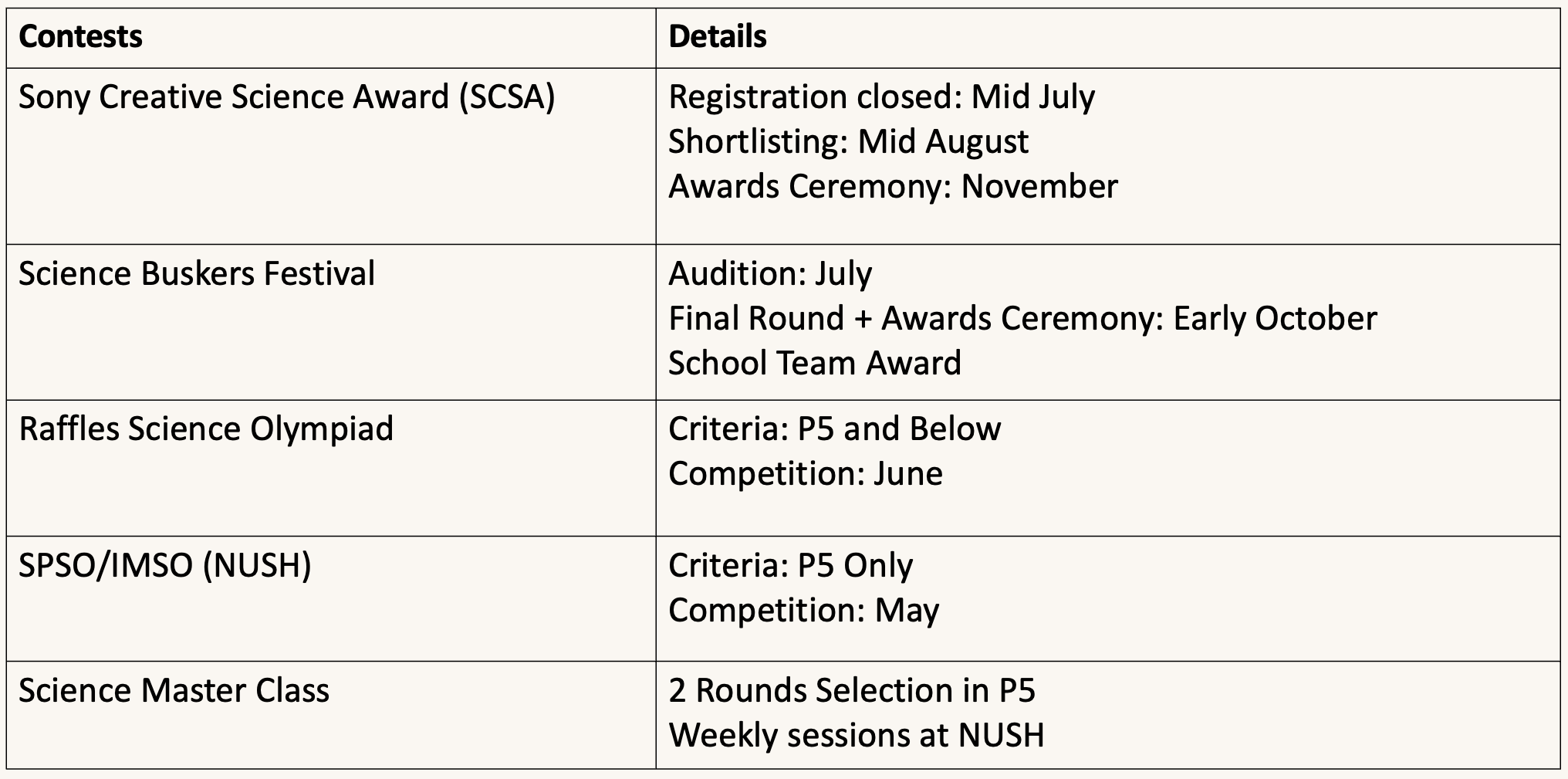
2- Engineering
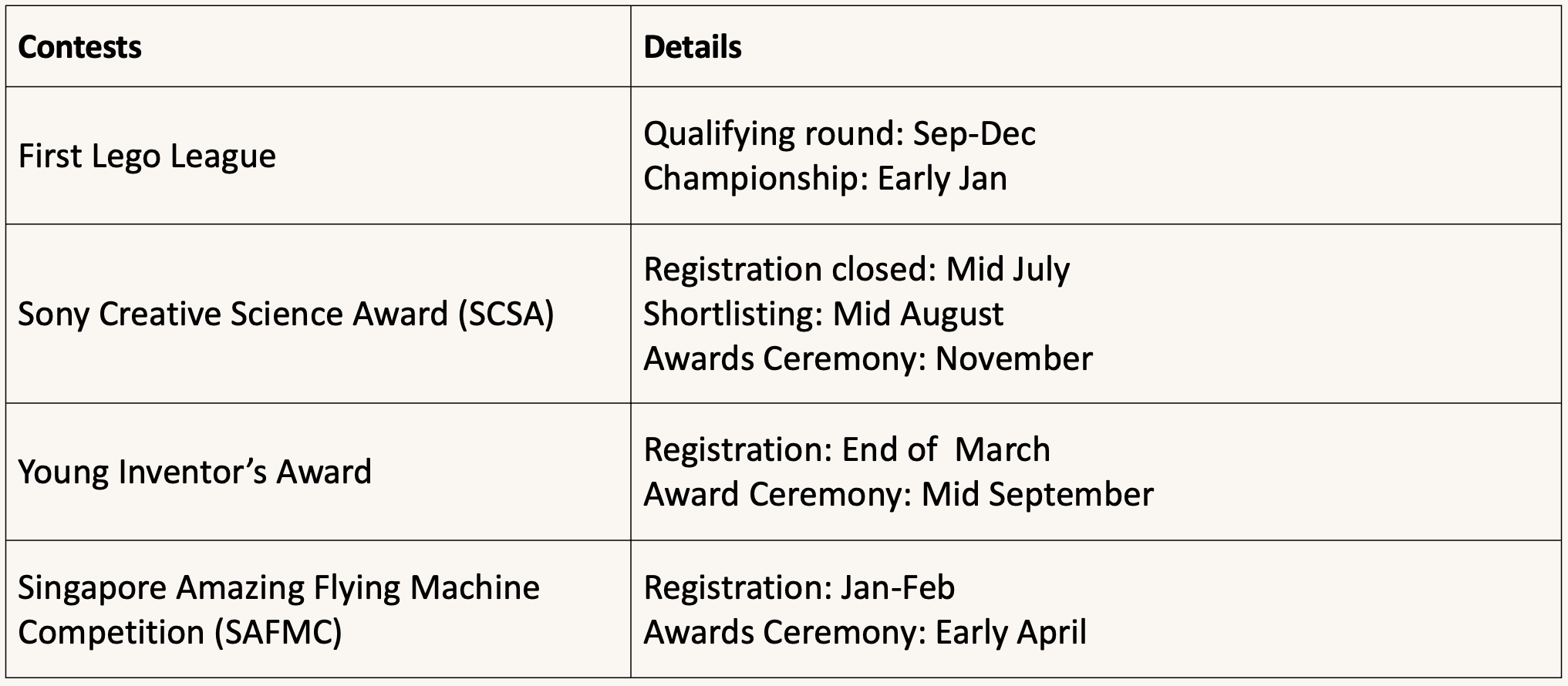
3- Science and Engineering
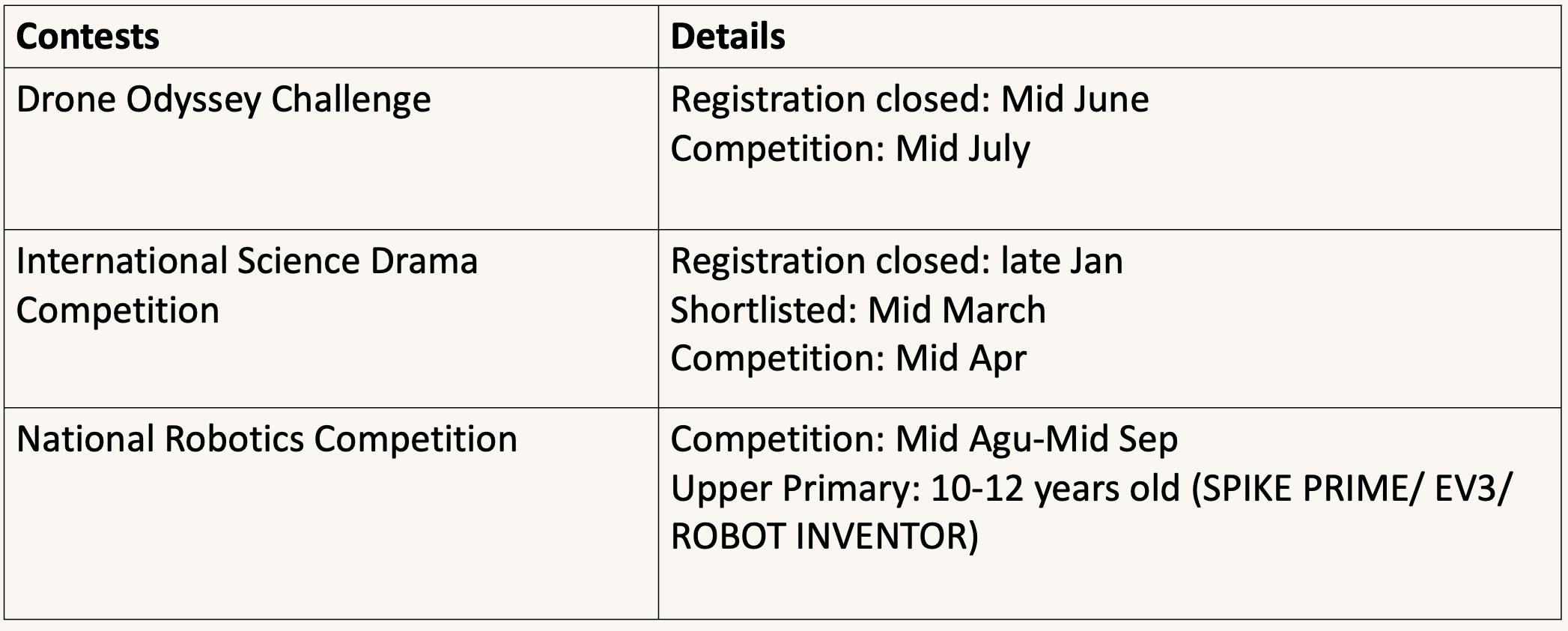
4- Mathematics
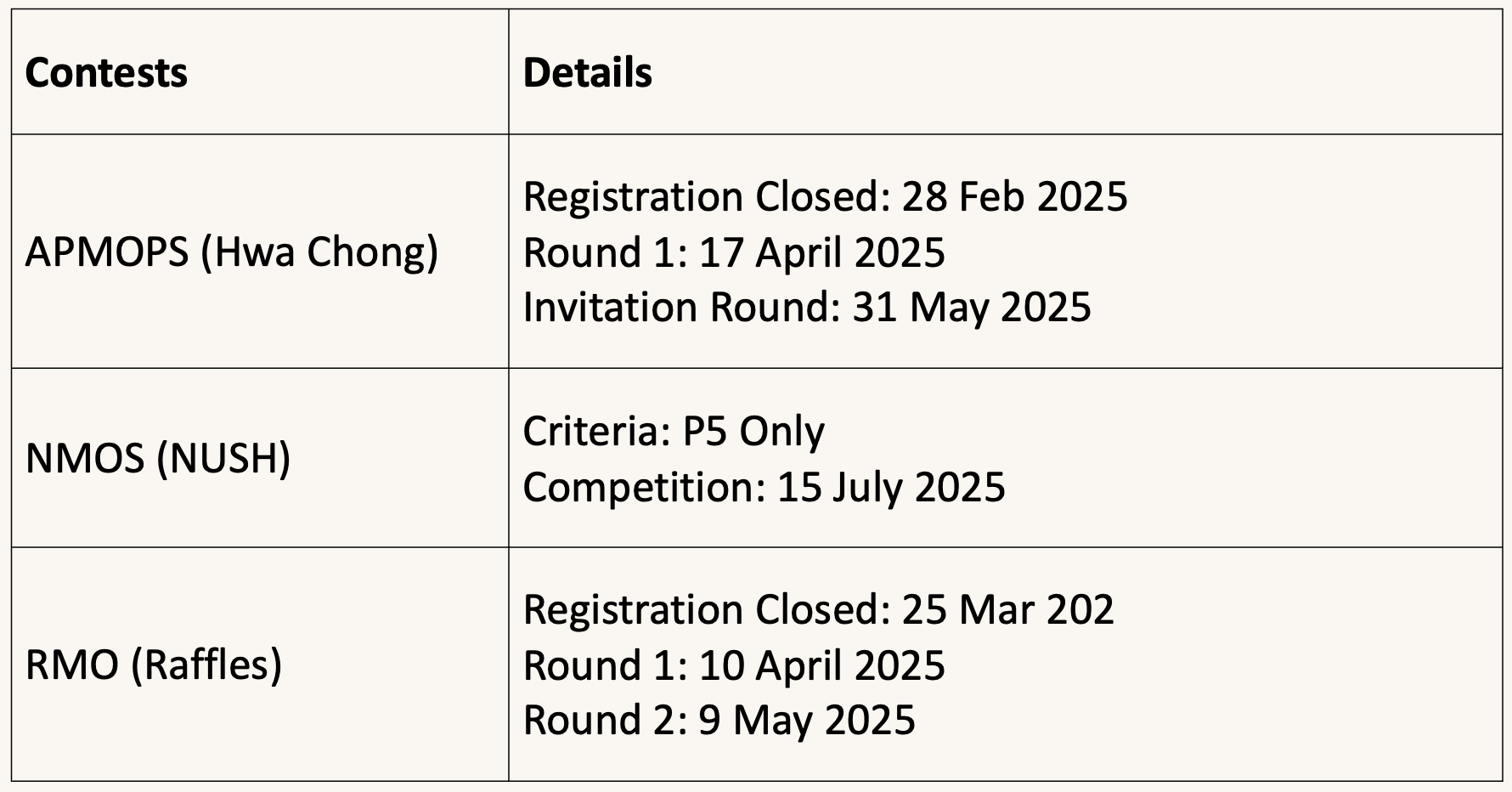
As a math learning center, I will show more details about 'Maththematics Domain'
APMOPS
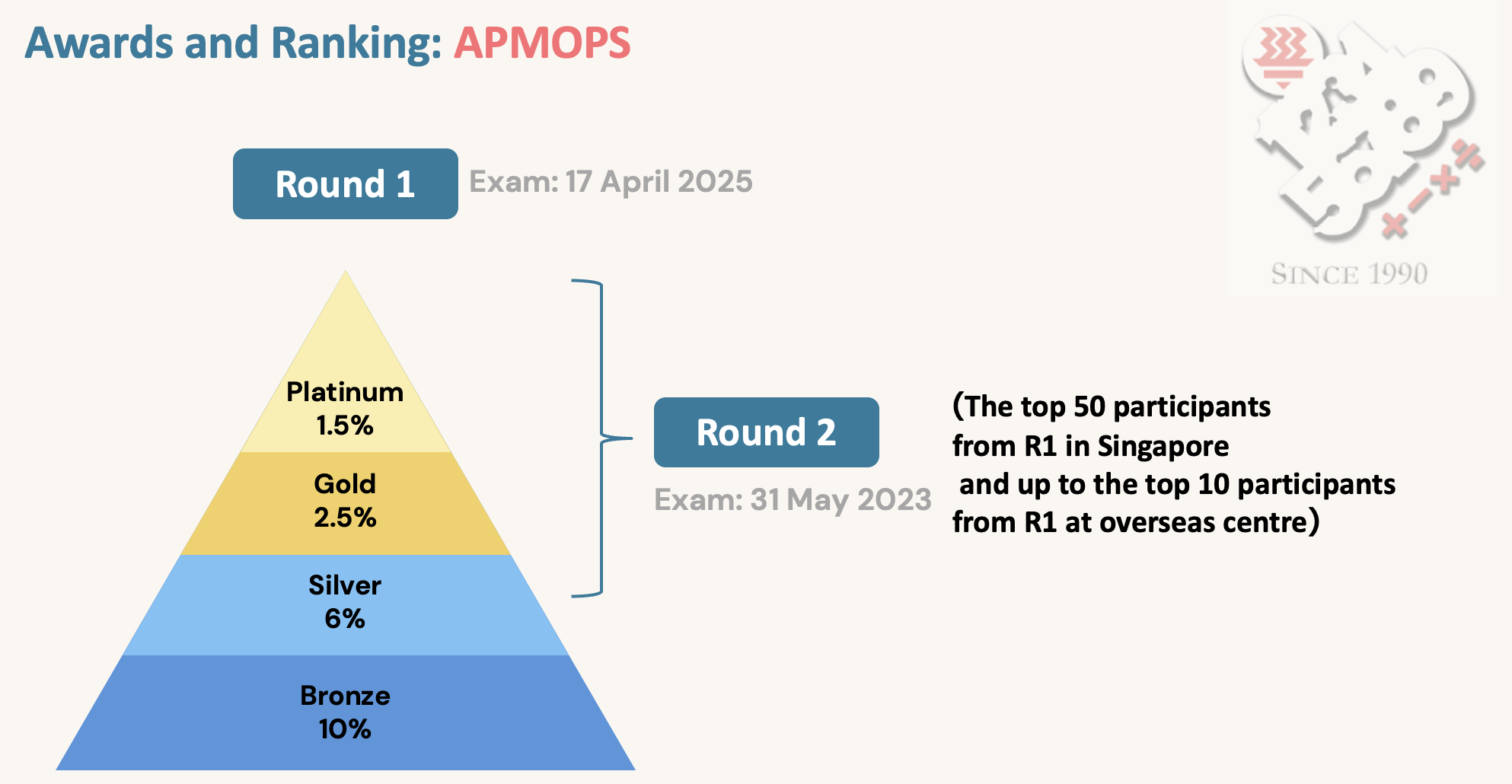
If a student can at least win a silver medal in APMOPS, it means they are in the top 10%, which will give them more confidence when applying for DSA in mathematics (for example, ACSI only accepts DSA applicants in mathematics who have a platinum in APMOPS).
At the same time, DSA applications only refer to the first round results of APMOPS, and the second round results will not be considered.
RMO
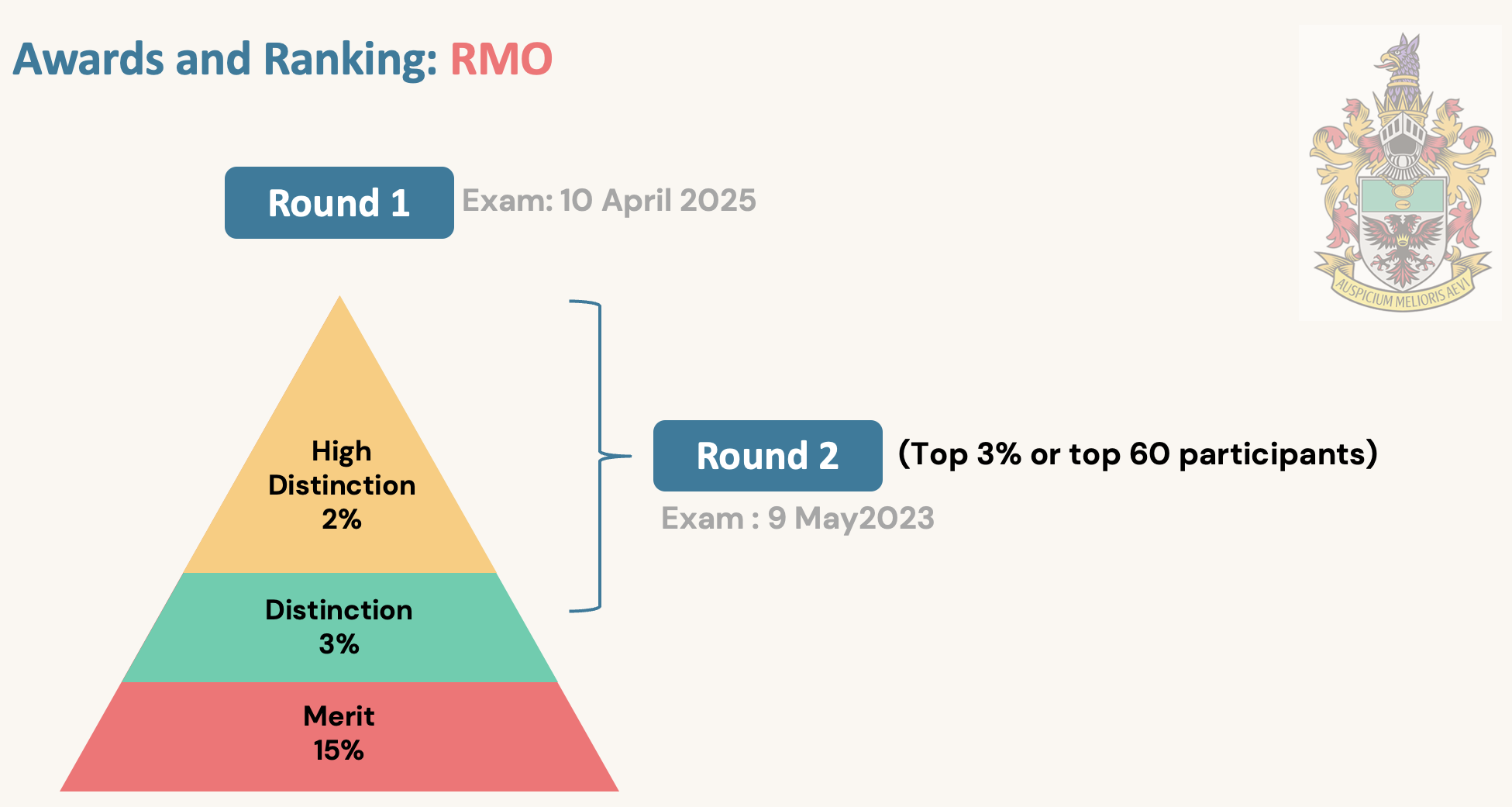
If a student can at least achieve a Distinction in RMO, it means they are in the top 5%, which will make them more competitive when applying for DSA in mathematics.
Similar to APMOPS, DSA applications only refer to the first round results of RMO, and the second round results will not be considered.
For detailed competition information on NMOS, APMOPS, and RMO, please refer to previous articles.
NMOS: https://bbs.kangaroo.study/forum.php?mod=viewthread&tid=1263&extra=page%3D1
RMO: https://bbs.kangaroo.study/forum.php?mod=viewthread&tid=1273&extra=page%3D1
APMOPS: https://bbs.kangaroo.study/forum.php?mod=viewthread&tid=1276&extra=page%3D1
2) Languages and Humanities
1. English
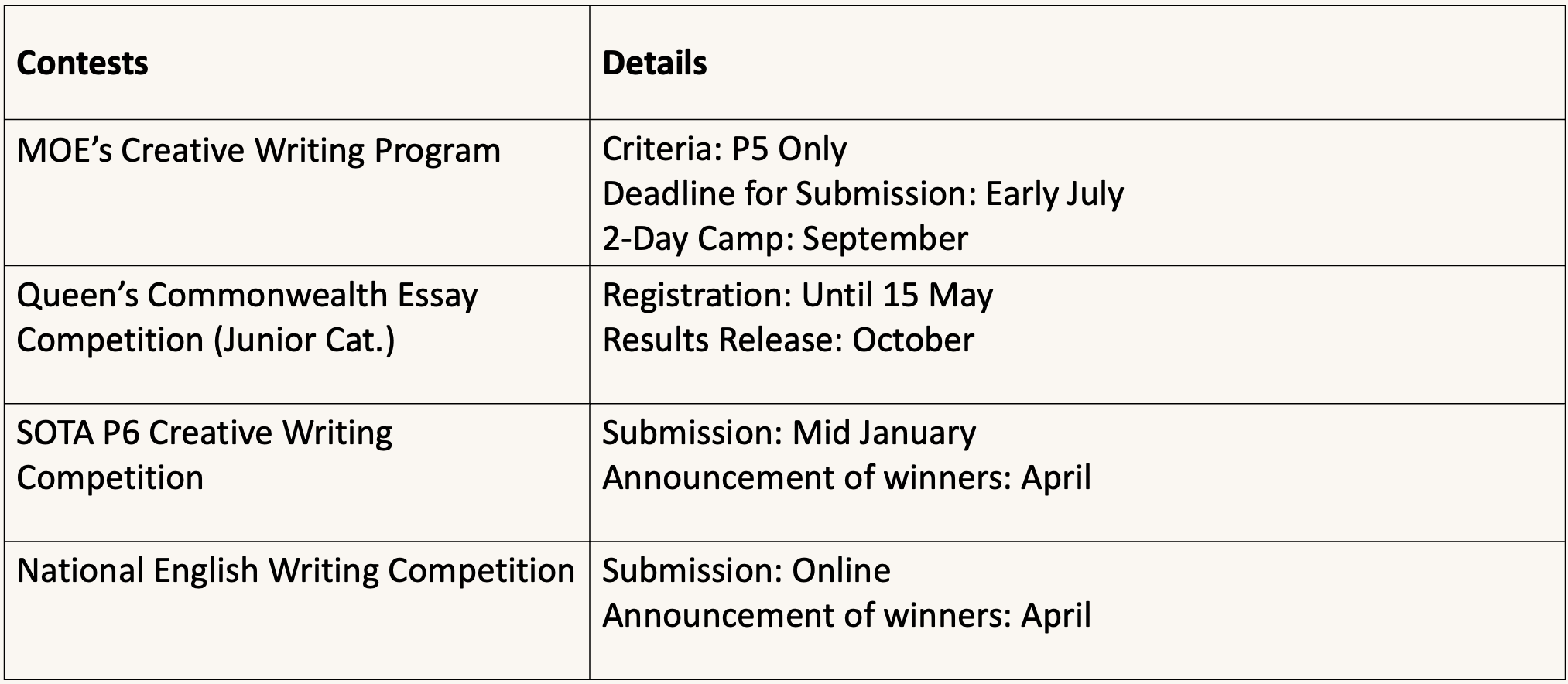
2. Chinese
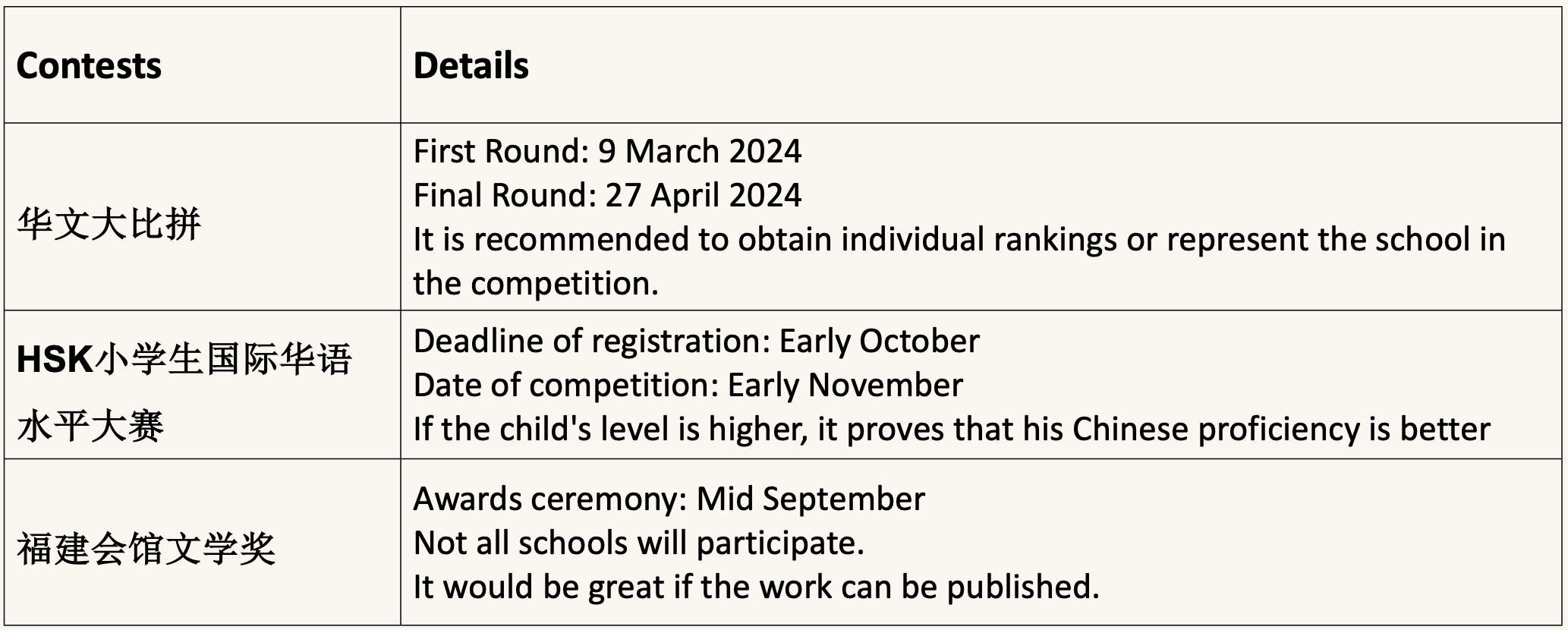
3) Sports and Games
In DSA applications, the sports domain is a highly competitive field. Many students who choose sports DSA will participate in the National School Games (NSG) and strive for good results to improve their chances of success.
NSG is the largest inter-school sports event in Singapore, covering 29 events and over 250 competitions, running from January to October each year. For students who wish to apply for secondary school through sports DSA, NSG is an important platform to showcase their strength.
NSG Official Website:
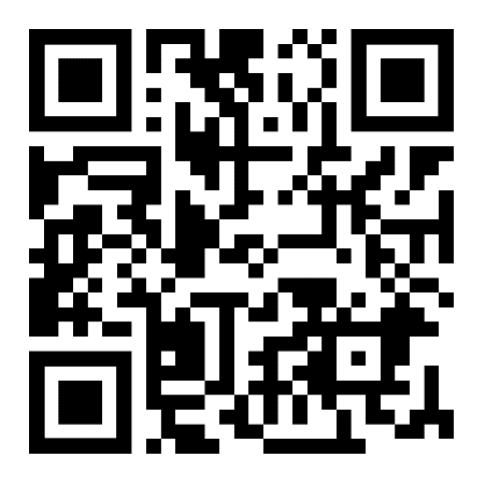
In NSG, reaching the top 8 nationally, or becoming a first-team player, is an important condition for applying for sports DSA.
Sports DSA is even more competitive than academic domains, with more applicants and relatively fewer spots for each event. Many students who choose sports DSA start professional training from a young age, some even before Primary 1, with some children training 5 to 6 times a week. At the same time, most parents will plan ahead, including choosing suitable primary schools, finding professional coaches, joining high-level clubs, etc.
4) Visual, Literary, and Performing Arts
1- Performing Arts
Unlike sports and academic domains, performing arts DSA not only values students' achievements but also emphasizes the subjective evaluation of judges.
First, performing arts DSA applications cannot do without grade exams. Generally, students applying for performing arts DSA need to meet the following minimum requirements:
Practical exam: at least grade 7.
Theory exam: at least grade 5.
Each grade exam usually takes 6 months to 1 year to prepare. Therefore, students need to start planning and practicing as early as possible.
In addition to grade exam results, performing arts DSA applications also require the following materials:
1 Portfolio and recommendation letters: for example, recommendation letters provided by famous teachers from the Nanyang Academy of Fine Arts (NAFA).
2 Showcase materials: including photos or videos of performances, showcasing the student's musical talent and stage presence.
3 Performance experience: if the student has held a solo recital or been invited to participate in concert performances, these experiences will add points to the application.
Applying for performing arts DSA at TOP schools is also very difficult, the instruments learned basically need to be two instruments, and both are at a professional level, preferably one Western and one Chinese. (For example, piano and guzheng)
Unlike sports and academic domains, in the performing arts DSA evaluation process, the personal preferences of the judges will also have a certain impact on the results.
2- Visual Arts
The visual arts domain is a field full of creativity and individuality. Similar to performing arts, visual arts DSA does not have mainstream competitions or exam projects, but evaluates students' artistic abilities through portfolios and on-site creations.
The core of visual arts DSA applications is the portfolio. Students need to showcase their abilities in multiple painting styles: sketching, oil painting, sculpture, watercolor, acrylic painting, etc.
Usually, the portfolio needs to include about 10 works, along with relevant certificates or award records. These works should reflect the student's creativity, skills, and artistic expression.
During the DSA selection process, students may be required to complete works on-site, not only testing their artistic abilities but also their adaptability.
The subjective evaluation of judges plays an important role in visual arts DSA, making the selection process full of uncertainty.
5) Leadership
The leadership domain (Leadership) is a relatively abstract but very important field. Unlike other domains, leadership DSA basically does not have related competitions or exam projects, but evaluates students' abilities through their leadership experiences in school and community.
The application conditions for leadership DSA mainly revolve around students' leadership roles and contributions in school and community, for example:
Having served as student council chairperson, class monitor in school; having served as captain, chairperson, etc. in CCA or uniformed groups; actively participating in community service projects and obtaining relevant certificates or awards (such as VIA certificates or leadership awards).
Taking the four major schools as an example, we have not yet heard of successful cases of applying through leadership DSA.
(If parents have successful cases around them, please feel free to add them in the comments, to provide experience references for other parents and children)
3. How to Choose a School

1. School Selection Directions
In DSA, school selection is mainly divided into two directions:
1- Have a particularly excellent domain: ignore the PSLE estimated score and directly choose the strongest school in that field.
2- Do not have a particularly outstanding domain: it is recommended to choose a school with a PSLE estimated score about two points higher to increase the chances of admission.
For the second situation, the PSLE score-oriented school selection strategy can be divided into four steps:
Step 1: Look at the score
Based on the child's PSLE estimated score (for example, AL8), choose a school with a slightly higher score (for example, AL6).
Step 2: Choose a school
Within the score range, choose the school the child most wants to attend.
Step 3: Find the Domain
Confirm whether the school has a Domain project that the child can apply for. If not, continue to find the next school.
Step 4: Review other factors
Admission situation: understand the school's admission difficulty through School Finder or consulting others.
Course type: IP or O-level, IB/A-level, understand the school's course projects.
Distance: consider the distance between the school and home.
School type: boys' school, girls' school, or co-ed school.
CCA: understand the school's CCA projects.
2. 2024 DSA Admission Situation Reference (Taking RI and HCI as Examples)
We take the folk data of Raffles Institution (RI) and Hwa Chong Institution (HCI) as examples to provide you with reference.
Last year, RI's admission policy was adjusted, with the number of admissions in academic domains reduced, while the number of admissions in non-academic domains (such as sports, arts, etc.) relatively increased, in response to the emphasis on diversified education.
STEM:
Mathematics: HCI about 20-25 students, RI about 6 students.
Science: HCI about 16-18 students, RI about 6 students.
Language:
English: RI about 10 students.
Malay: RI about 8 students.
Chinese: HCI about 10-12 students.
Bilingual: HCI about 10-12 students.
Others:
Sports: usually about 4 students per event (for example, RI tennis 4, HCI badminton 5).
Arts or music: usually about 3 students per event.
Leadership: usually about 4-6 students.
4. Special Schools
There are four schools in Singapore that admit students entirely through DSA:
1️-NUS High School (NUSH): only admits students in mathematics and science, graduates are awarded the NUSH diploma, students do not need to take the A-Level or IB exams.
Admits 180 students each year, with an admission rate of about 15%.
2023 data:
Number of applicants: about 2,000.
Second round selection (camp activities): about 400 candidates.
Final admission: about 180 students.
Admission rate: about 15%.
Application advantages
1- No threshold application: as long as children apply to NUSH, they can participate in the selection exam, no additional conditions required.
2- Emphasizes on-site testing: NUSH values students' actual test performance more than their school grades.
Even if the child's school grades are very excellent, if they do not pass NUSH's written test and camp, they cannot directly obtain DSA admission.
2-School of the Arts (SOTA): covers visual art, music, dance, literature, and drama,
Each year about 1,000 people apply, 220-240 are admitted, with an admission rate of about 22%-24%.
Among them, visual art admits about 70 students each year, making it one of the largest domains of SOTA.
SOTA's selection process includes multiple stages:
Personal audition/portfolio presentation and interview
Group activities
Group interview
Online questionnaire survey
3-School of Science and Technology (SST): leans towards STEM education, admits about 200 students each year, with an admission rate of 20%.
Past admission data
Number of applicants: about 1,000.
Shortlist: about 500.
Final admission: about 200.
Admission rate: about 20%.
About 50% of SST students can enter junior college (JC) to continue their studies after graduation.
4-Singapore Sports School (SSS):
About 100 students are admitted through DSA each year.
Only about 20 of them can enter the IB program.
The school provides professional training supported by nutritionists to help students develop comprehensively.
After achieving excellent results in competitions, students may receive rewards such as free tuition and accommodation, but may need to live on campus.
5. DSA Application Process
(1). Important Time Periods
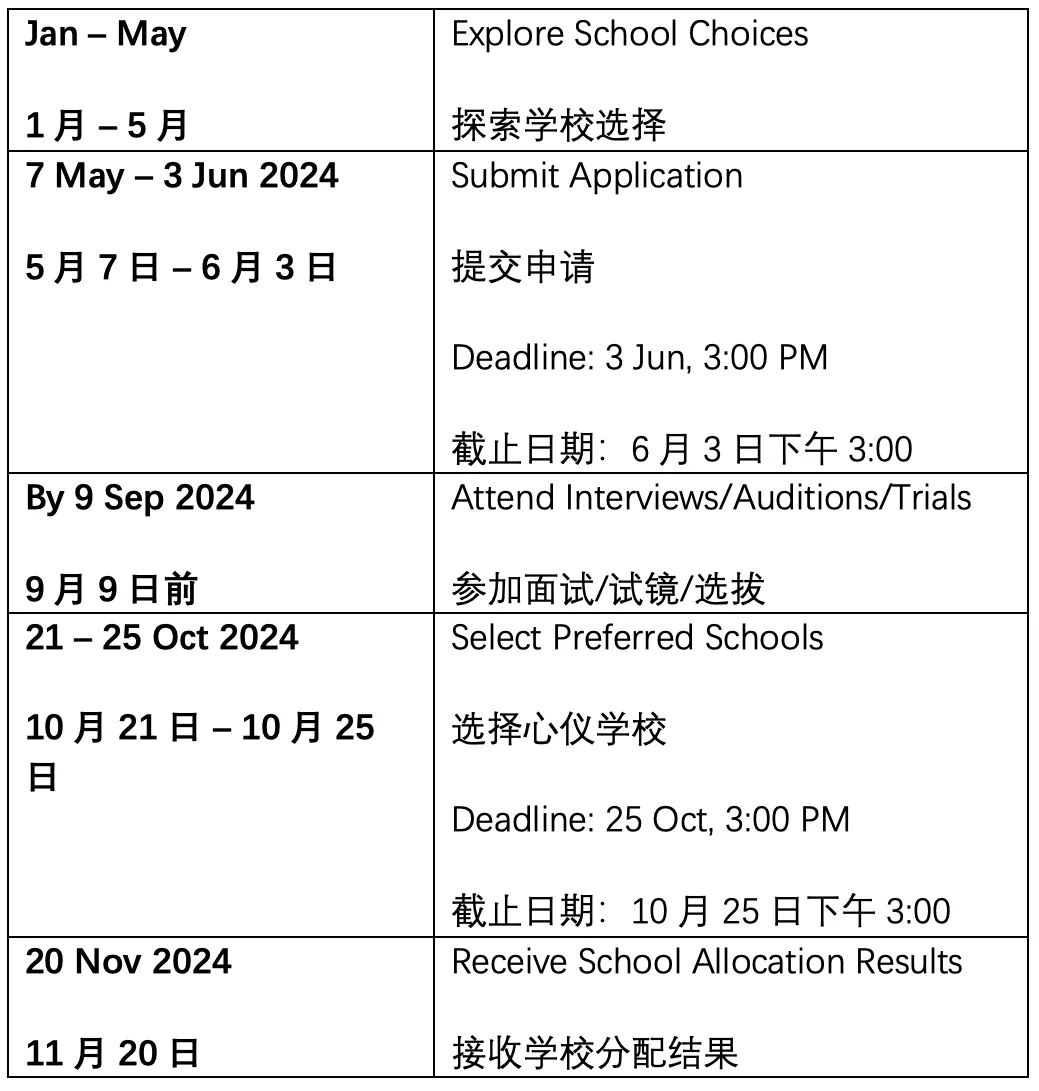
What can be done now?
Explore DSA options, research schools, attend open house events
Please refer to the official website to view schools School Finder:
https://www.moe.gov.sg/schoolfinder/�

In addition to the MOE school finder, parents can also use the following website to view schools based on more criteria (recommended to view on a computer), such as geographical location, school category, Domain, etc.:
https://public.tableau.com/app/profile/sg.parent/viz/SingaporeSecondarySchoolSearchDSA/Search
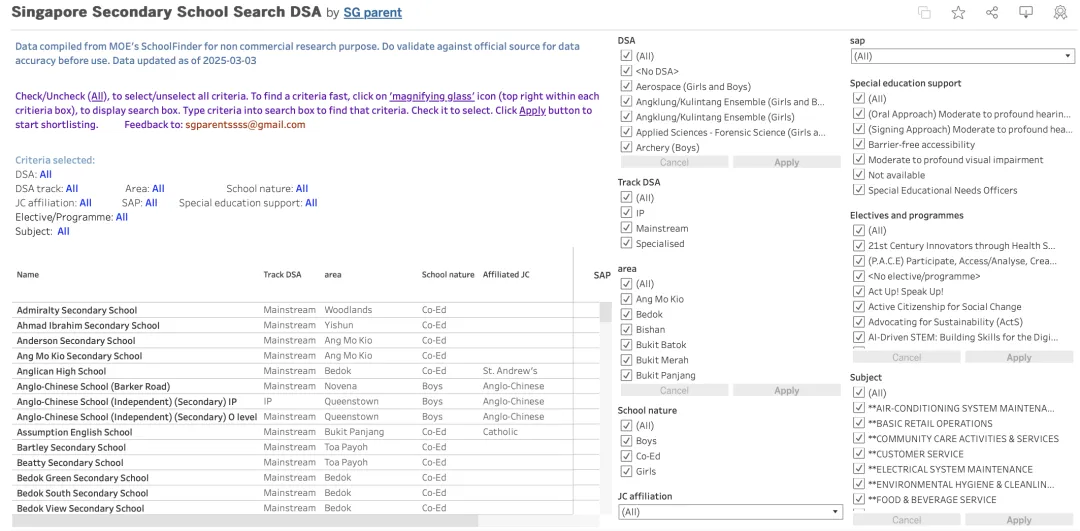
In addition, school open houses are also opportunities that parents should not miss, because in addition to understanding the school atmosphere and environment, parents can also learn more about the school's DSA Domain.
For example, many parents do not understand DSA leadership, such as whether the school only requires participation in leadership training after entering secondary school, or whether specific positions need to be held, will students be appointed as grade representatives or will they be required to join uniformed groups?
Then these school-specific details can actually be directly consulted with the school during the open house. In addition, open houses usually also have students sharing their DSA experiences, providing valuable references for parents.
The following is a list of schools that have announced open house dates so far, we will continue to update the list:
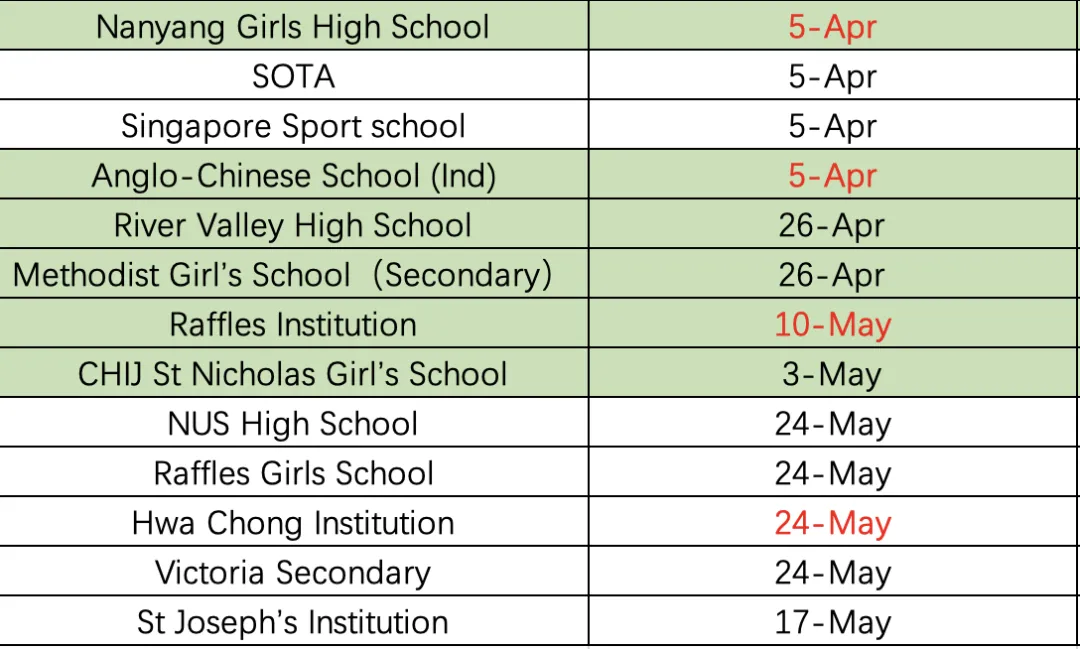
Conclusion
School selection is a crucial step on the road to further education for children, and DSA applications require parents and children to invest time and energy in planning and preparation. Through this article, we hope to provide you with some practical advice and clear ideas to help you have a better sense of direction in the process of choosing a domain and selecting a school for your child.
However, what you get from paper is ultimately shallow, and real understanding requires going into the campus and communicating with the school face-to-face. In the next few months, various schools will hold open house events one after another, which is a great opportunity for parents to learn more about the school and answer questions. We will also bring more questions from parents who have privately messaged us, and personally visit each school's open house, bringing you the latest information and in-depth interpretation as soon as possible. Whether it's the school's DSA policy, CCA characteristics, or students' real experiences, we will present them to you more detailly.
If you are interested in DSA applications, school selection strategies, or open house information, be sure to Join our PSLE 2025 group! We will continue to update the "2025 DSA" series of articles, providing you with more practical dry goods and first-hand information. Let us accompany our children and take every step of further education well!
DSA series of articles, to be continued...
Any question or requirement abourt DSA, PSLE or studying, please contact teacher Meng and also Join in our 'PSLE 2025' studying group!
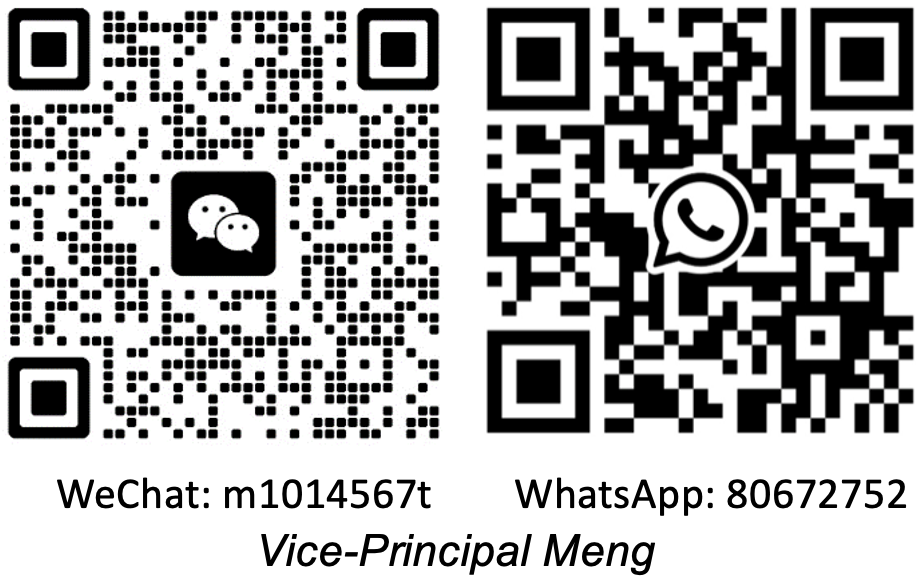
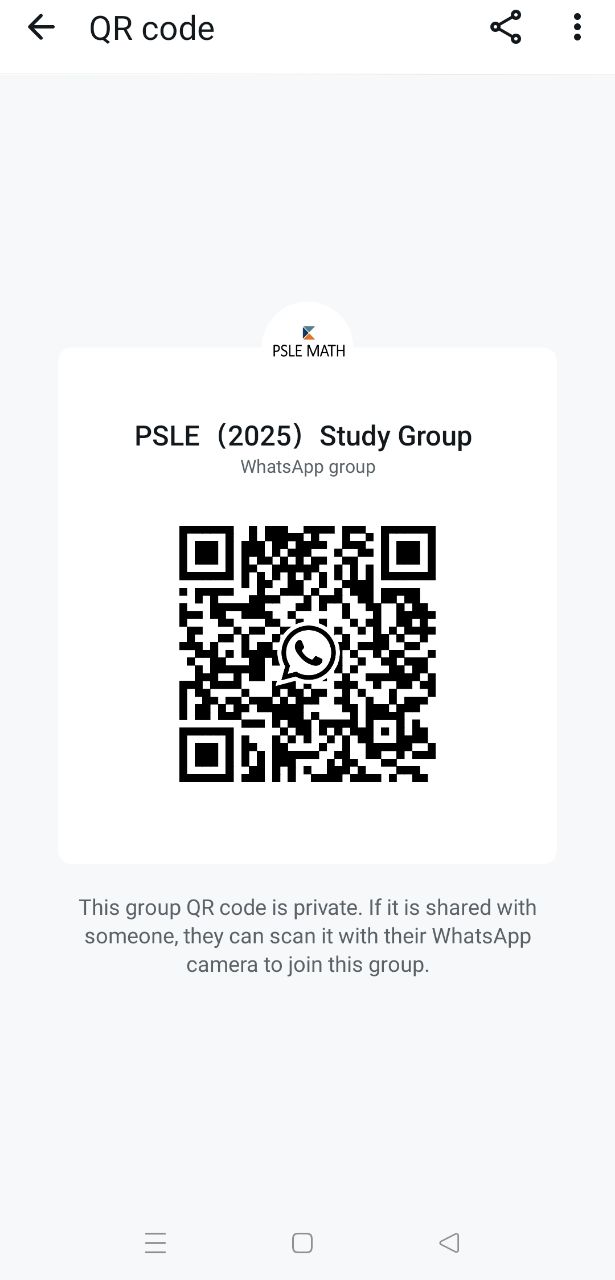
|
|